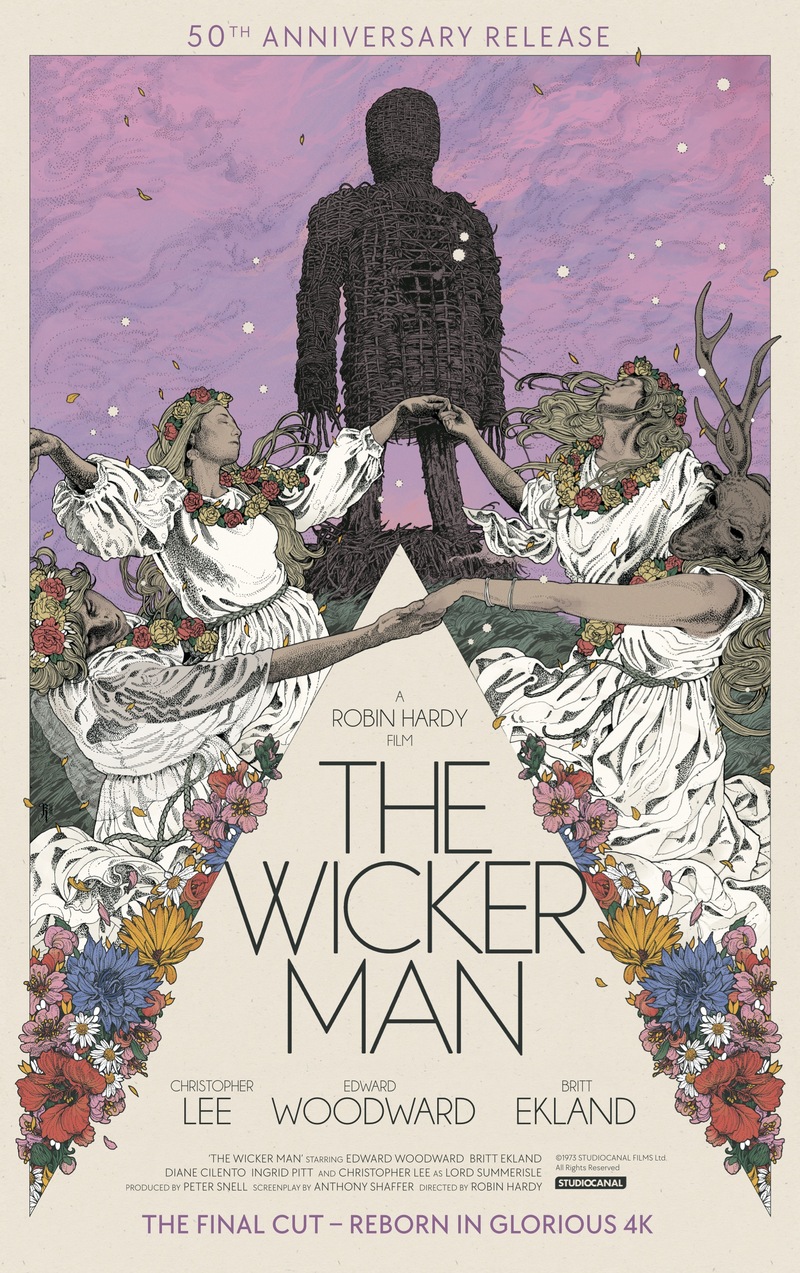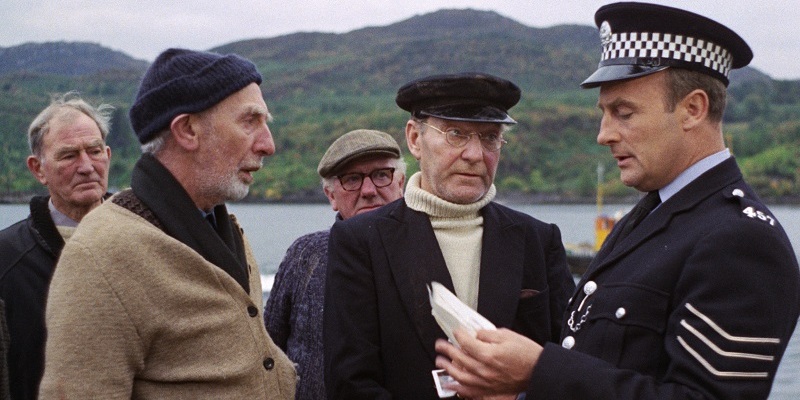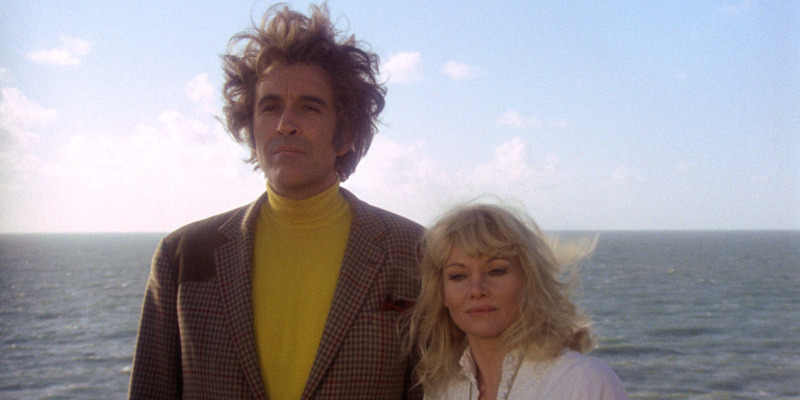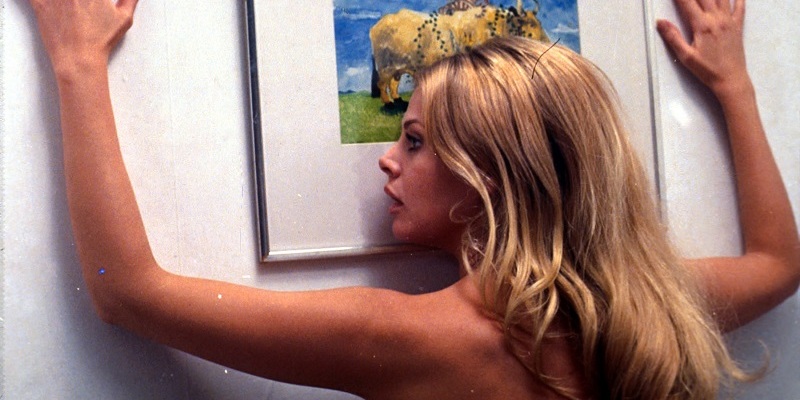
Review by
Eric Hillis
Directed by: Robin Hardy
Starring: Edward Woodward, Christopher Lee, Britt Ekland, Diane
Cilento, Ingrid Pitt

Jean-Luc Godard called his
King Lear
"A picture shot in the back," referring to the difficulties of working
with Cannon Films. 1973's The Wicker Man might be
described as a film buried twice, but ultimately resurrected. On its
initial release it was buried as the b-picture in a double bill with
Don't Look Now and was quite literally buried when its
negative was used as landfill for the then under construction M3 (either
accidentally or as star Christopher Lee believed, quite on
purpose).
Along with such poor treatment, the film was originally put out in a
butchered cut that disrupted its narrative timeline. A couple of decades
later, Roger Corman revealed that he was in possession of a print of
director Robin Hardy's original cut, leading to the subsequent
release of a director's cut. In 2013, some more footage was discovered
and a "Final Cut" was released to celebrate the film's 40th anniversary.
No more footage has been uncovered for this 50th anniversary release,
but the movie has been restored in 4K and now looks better than
ever.

The early 1970s was something of a hangover from the swinging '60s, and
this was heavily reflected in Britain's genre cinema of the era. At the
time there was both a mistrust of the hippy counterculture brought on
largely by the Manson murders, and of institutions and the elite,
ushered in by various scandals. There was also a growing divide between
urban and rural folk, who increasingly viewed each other with a mutual
suspicion.
All of these factors come to a glorious head in
The Wicker Man. Some viewers will take the side of its Christian protagonist, others
will sympathise with its pagan antagonists, but the film is neither
critical nor supportive of either faction. If it's critical of anything
it's of those who wield power, whether that be Edward Woodward's
fascistic cop Sgt Howie or Lee's Lord Summerisle, who rules the small
Scottish island as a dictator. Both can be viewed as colonial
interlopers. Howie has arrived from the mainland and displays contempt
for the ways of its people. Summerisle's grandfather was essentially an
English gentrifier who rocked up to the island and replaced its
Christian traditions with "the old ways."
Howie travels to Summerisle after receiving an anonymous letter
concerning the disappearance of Rowan Morrison, a 13-year-old girl whose
existence is initially denied by the islanders, including the woman
Howie believes is the girl's mother. As Howie investigates further it
becomes clear the wool is being pulled over his eyes. He learns that
Rowan died several months earlier, but finds that her coffin contains
only the corpse of a hare.

All the while, Howie grows increasingly contemptuous of the sexual
freedom practiced by the islanders, who sing bawdy songs and copulate
openly in public orgies. As Jack Nicholson's character says in
Easy Rider of men like Howie, "They hate you because you
represent freedom." Howie is essentially a fascist enforcer for both the
police force and his Christian God, unquestioning of either. The people
of Summerisle are really no better though. They've fallen for
Summerisle's pagan blarney, which allows him to rule from the big
house.
I doubt there's anyone who is unfamiliar with the film's climax, but
spoiler warning from here if so. We
learn that Howie has indeed been lured to Summerisle under false
pretences. The previous year the apple crop failed and Summerisle
believes only a human sacrifice to appease the Gods can ensure this
year's crop is a success. Howie is chosen because he's a virgin, having
resisted the charms of Willow (Britt Ekland), the landlord's
daughter at the island's raucous pub. In one of the film's most
memorable scenes, Willow sings and dances naked in her room while Howie
sweats profusely next door. Like Charlie in
Willy Wonka and the Chocolate Factory, Howie is subjected to a purity test, though his "reward" is less
enticing.
The title of course refers to the giant structure in which Howie is set
to meet his maker. Woodward's lines were painted in giant letters on
bedsheets on a nearby cliff, and the actor's distant gaze as he reads
from them gives the effect that he's looking for his God in his time of
desperation.

The Wicker Man is a movie that benefitted greatly from
both chance and improvisation. The latter can be seen when Howie enters
the graveyard and fashions two pieces of wood into a cross, a bit of
business that wasn't in the script but was pounced upon by the
instinctive Woodward. Despite being set around Mayday, the film was
actually shot in October. When Howie arrives on the shores of Summerisle
it's clearly a blustery autumn day, as is the case with the closing
scenes on the island's coastal cliffs. The scenes on the island's
interior however could easily have been shot in May, and the combination
of beaming sunlight and the colourful flora give the impression that the
island is like a fruit itself, its ripe insides masked by a hard peel.
Perhaps the greatest piece of luck befell the film when the head of the
giant wicker man collapsed at just the right time to reveal the rising
sun in the distance. For 21st century viewers, this shot now has an
eerie resonance with the collapse of the World Trade Center.
All three cuts are included on Studiocanal's re-release, but the Final
Cut is probably the best option. The theatrical cut compresses the
events to two days rather the three of the other cuts. There's a sense
that Howie is being both tested and taunted by the islanders that's
somewhat lost in this two-day version. Perhaps the biggest difference
concerns the use of Willow. In the theatrical cut she performs her
seductive dance on the first night. It's far more effective in the other
cuts, which move it to the second night, when Howie has had time to
expose himself to the island's libertine ways. The director's and final
cuts also feel more democratic in giving us a bit more time to soak up
the ways of the islanders and make our own minds up as to who is crazier
here: the islanders who believe committing murder will save their way of
life, or the devout Christian who commits himself to a God whose
existence he sees no proof of?

